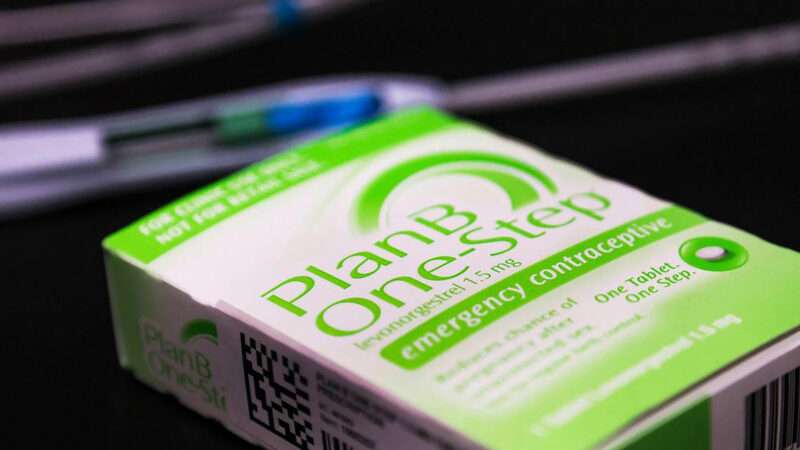
Between August 2022 and October 2023, the number of people filling emergency contraception prescriptions in Massachusetts spiked. Was the state experiencing an epidemic of unprotected sex?
Probably not. Researchers attribute the increase to the state making it easier for pharmacists to dispense the emergency contraceptives ulipristal (sold under the brand name Ella) and levonorgestrel (sold as Plan B), thereby making it easier for women to walk into a pharmacy and quickly walk out with the medication.
Making emergency contraception easier to prescribe and easier to get leads to more people getting emergency contraception. Who would've guessed?
Removing Barriers to Access
"Emergency contraceptives are key in preventing pregnancy after unprotected sexual intercourse and contraceptive failure," note Dima M. Qato, PharmD, Jenny Guadamuz, and Rebecca Myerson in a research letter published by the Journal of the American Medical Association (JAMA).
More than two dozen states now allow birth control pills—including emergency contraception—to be picked up at a pharmacy without first obtaining a doctor's prescription. These medications are still technically prescription-only (as required by the U.S. Food and Drug Administration), but a pharmacist can write someone a prescription on the spot.
"However, these policies require pharmacists to undergo additional training and patients must complete a health questionnaire," the researchers explain in their JAMA letter. "Given these barriers, many pharmacies do not implement pharmacist-prescribed contraception services."
In an attempt to overcome pharmacy barriers, Massachusetts did something unusual: it deregulated. In August 2022, the state issued a statewide standing order allowing pharmacists to dispense the emergency contraceptives ulipristal and levonorgestrel without doing any extra training. Pharmacists could prescribe the medications to someone after asking just a few basic questions.
"The Massachusetts policy overcomes prescribing barriers by using the state as the prescriber," note Qato and colleagues, all professors in some form of health education (Qato at the University of Southern California's School of Pharmacy and Pharmaceutical Services, Guadamuz at the University of California, Berkeley School of Public Health, and Myerson in the University of Wisconsin Madison's Department of Population Health Sciences). Their study "evaluated the association between Massachusetts' statewide standing order and emergency contraceptive fills at retail pharmacies."
They found that emergency contraception fills went up after the standing order was implemented—from 78.5 per 100,000 women of reproductive age in Massachusetts to 105.3 fills per 100,000 women.
Same Spike Not Seen in Other States
The increase in emergency contraception fills was associated with a spike in prescription-only ulipristal fills and no significant change for prescribed levonorgestrel, which is also available without a prescription. The authors note that ulipristal is effective for up to five days after unprotected sex, compared to three days for levonorgestrel, and is considered more effective in overweight and obese women.
OK, you might be thinking—but this was right after the Dobbs decision, which overturned Roe v. Wade. Couldn't fear about what the decision would mean for birth control or abortion access have led to an increase in emergency contraception prescriptions? That's indeed plausible.
But Qato and her colleagues didn't simply find an increase in Massachusetts residents picking up prescription emergency contraception. They also found an increase that was 32 percent larger than in comparison states.
The comparison states they used were Illinois and Connecticut. "Illinois and Connecticut did not implement statewide standing orders but otherwise resembled Massachusetts in their abortion and contraceptive policies, including requiring insurance to cover prescribed emergency contraceptives without cost sharing," note the researchers.
In Illinois and Connecticut combined, there were 45.8 emergency contraceptive fills per 100,000 women during the first period studied (July 2021 to May 2022) and 48.4 in the second period (August 2022 to October 2023). All in all, "the statewide standing order policy was associated with an additional 25.2 emergency contraceptive fills per 100,000 in Massachusetts vs comparison states," the researchers found.
Their conclusion: "Policies that reduce prescribing barriers may improve access to emergency contraceptives."
That takeaway may seem obvious, but it's still nice to have some data to back up our common sense. The study provides one more piece of evidence to suggest that activists and politicians aiming to prevent unintended pregnancies and reduce abortion numbers should figure out ways to remove access barriers to emergency contraception.
Alas, we can't really draw any conclusions about whether or how the Massachusetts policy change on emergency contraception affected abortion rates in the state, since the state concurrently saw an influx of out-of-state visitors seeking abortions. In general, evidence has been mixed on whether increasing access to emergency contraception brings down abortion rates.
More Sex & Tech News
• The Volokh Conspiracy details a great new ruling on geofence warrants—"warrants to access location information for users who have opted into having Internet providers retain location history." The U.S. Court of Appeals for the 5th Circuit held "that because the database of geofence records is so large, and because the whole database must be scanned through to find matches, the Fourth Amendment does not allow courts to issue warrants to collect those records," notes Orin S. Kerr. "In legal terms, it is impossible to have a warrant particular enough to authorize the surveillance. The government can't gather these kinds of online records at all, in other words, even with a warrant based on probable cause."
• "The Harris campaign has been editing news headlines and descriptions within Google search ads that make it appear as if the Guardian, Reuters, CBS News and other major publishers are on her side, Axios found:
It's a common practice in the commercial advertising world that doesn't violate Google's policies, but the ads mimic real news results from Search closely enough that they have news outlets caught off guard.
- According to Google's ad transparency center, the Trump campaign isn't running these types of ads, but this technique has been used by campaigns before.
- The ads say that they are sponsored, but it's not immediately clear that the text that accompanies real news links is written by the campaigns and not by the media publication itself.
• What is Nostr and why does Twitter founder Jack Dorsey call it "100 percent what we wanted"?
• Thierry Breton, the European Union's internal market commissioner, warned Elon Musk that he could be liable for failing to stop the "amplification of harmful content" on X. But "the European Commission denied that Breton had approval from its president Ursula von der Leyen to send the letter," reports the Financial Times. More:
Breton is empowered to oversee enforcement of the Digital Services Act and can communicate independently with companies.
In his letter, Breton cited [Musk's] upcoming interview [with Donald Trump] and said he was "compelled" to remind Musk as the "individual entity ultimately controlling a platform with over 300mn users worldwide, of which one-third are in the EU" of his legal obligations under the Digital Services Act.
Musk responded to the letter from Breton with a meme from the 2008 film Tropic Thunder, that showed one character yelling: "Take a big step back and literally fuck your own face."
• An economics professor points out flaws in a study about harms associated with TikTok and Instagram.
• California's artificial intelligence bill threatens to derail open-source innovation, Andy Jung warns.
Today's Image

The post Emergency Contraception Fills in Massachusetts Spiked After This Policy Change appeared first on Reason.com.







